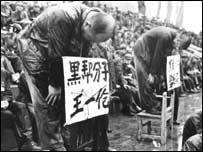
There’s a brief but interesting article on a new book by a photographer who managed to photograph some of the Cultural Revolution’s most terrible scenes, especially in the countryside.
Mr Li’s black and white pictures show mass rallies, ritual humiliations, beatings, executions and passionate revolutionary enthusiasm….
“It’s not only you who are shocked by the pictures. I hope if the book is published in China, my compatriots will be shocked too. I want to tell the true story of the Cultural Revolution, to serve a purpose.”
I’m not sure how easy it will be to get a book like this published in China; it would sure be a wonderful thing.
1 By Michael
By Michael
… So, this is where political correctness ends.
That the guy lived through it to finally get the pics out was just amazing.
September 13, 2003 @ 8:26 pm | Comment
2 By Steve
By Steve
There is no doubt Mao’s year is full of tragedies for chinese people. Mao has tremendously mis-managed China.
However, we have to keep in mind that the group which has suffered most in Mao’s year is intellectuals and used-to-be-rich-or-educated people. The group is small in numbers, but they can record their misery in books, especially in English.
The people which benefit from Mao’s policy is mostly poor and illiterate. They will rarely write in Chinese, let alone English. Therefore it is easy to get one-sided story. It will be helpful if you can talk to some peasants in chinese.
In chinese, there is a saying: “Do not make enemies with intellectuals. They will write history books painting you badly.” Mao apparently get his payback.
September 14, 2003 @ 5:25 am | Comment
3 By richard
By richard
Hi Steve,
I am very curious to know how the Chinese peasants feel about Mao. Can you tell us more about this? (Are you in China?)
September 14, 2003 @ 6:06 am | Comment
4 By Steve
By Steve
I worked in a poor countryside for two years. The comments from peasants largely follows party line. This may be due to the brainwash from propaganda.
In Mao’s year, peasants did not suffer as much as intellectuals. Generally social status goes down in the order “solider>worker>peasant>intellectual”. (Mao once sent intellectuals to countryside. Lots intellectuals regard this experience as great humiliation). During Mao’s time, peasants were also poor, but they were equally poor.
Deng’s success in agriculture is, to some extent, built on Mao’s legacy: such as irrigation system, hybrid rice, etc. (Recent SARS reminds people of “barefoot doctors”).
Mao’s time is essentially the tyranny of majority (illiterated mass) against the minority (educated). Compared with present time, the society was up-side down.
September 18, 2003 @ 3:46 am | Comment
5 By Nancy
By Nancy
I am doing an art project, a 3-d collage of a country’s political history, but I cant seem to find any good pictures. I need more like the black and white one posted here. any suggestions?
(Asian Pride!)
September 24, 2003 @ 5:16 pm | Comment
6 By M & E
By M & E
U guys are soooooo random!!!
November 16, 2003 @ 1:08 am | Comment
7 By Beth
By Beth
hey i am doing some coursework on Mao and his political and economic policies and comparing them to Deng Xiaoping’s i was wondering if you could guide me to any sites that could help me.
November 23, 2003 @ 11:35 pm | Comment
8 By Michelle
By Michelle
hey we’re doing a history fair project and we need primary sources
so we were wondering if you could tell us more information on how you were involved in the revolution and stuff about yourself.
December 7, 2005 @ 12:42 pm | Comment
9 By Kristal
By Kristal
Hey i’m also with michelle and we are both in the same group.
we live in brownsvill/texas and if you live here too
maybe we can interview or so
Chinese Cultural revoltion or Chinese revolution is very cool so please give us as much as information as possible
December 7, 2005 @ 12:47 pm | Comment
10 By Kristal
By Kristal
Hey i’m also with michelle and we are both in the same group.
we live in brownsvill/texas and if you live here too
maybe we can interview or so
Chinese Cultural revoltion or Chinese revolution is very cool so please give us as much as information as possible
December 7, 2005 @ 12:47 pm | Comment